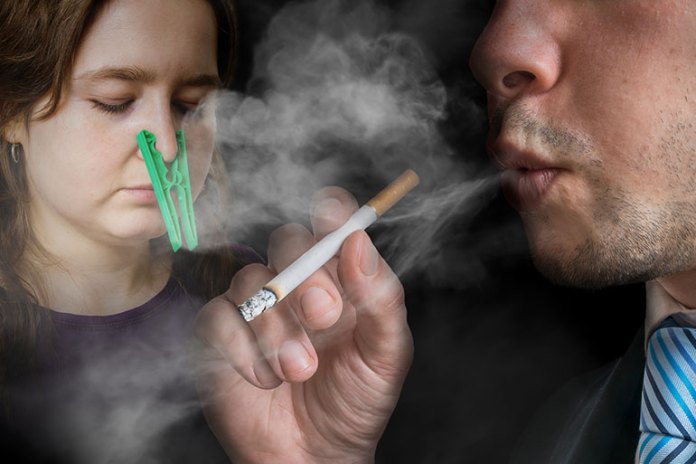Smoking is a habit common throughout the world. The health hazards of smoking are numerous and it directly or indirectly is responsible for various diseases. Inhaling tobacco smoke that is exhaled by a smoker, commonly known as secondhand smoking or passive smoking, is more harmful than smoking tobacco and its products. Millions of children are exposed to secondhand smoke in their own homes, which is extremely harmful their health, as their lungs are still developing. Children exposed to secondhand smoke may be in more danger than you realize.1 There is just one way to eliminate this exposure – quit smoking.
What Is Secondhand smoke?

Secondhand smoke, often called as environmental tobacco smoke, is the smoke exhaled by smokers, emitted from the tip of burning cigarettes, pipes, and cigars. Secondhand smoke contains about 4,000 chemicals, many of which are harmful and over 50 of them can cause cancer. Whenever children inhale secondhand smoke, they risk exposure to these chemicals.2
It’s important to understand the risks of passive smoking on young people. Children are particularly at risk of health problems as a result of breathing in the smoke from a smoker’s cigarette.3 Research shows that children of parents who smoke may have an increased risk of,
- Sudden Infant Death Syndrome (SIDS or cot death)
- Respiratory infections, bronchitis, bronchiolitis and pneumonia
- Slower lung growth
- Middle ear diseases
- Wheezing, coughing and breathlessness
- Developing the habit of smoking4
Health Effects On Children

Children are more vulnerable than adults to secondhand smoke. If the parents have the habit of smoking, the best way to protect their children from secondhand smoke is by ensuring that they don’t smoke inside the house and the car. The children, whose parents smoke, have higher rates of respiratory infections and wheezing problems during their first two years of life compared to children of non-smokers. Children exposed to secondhand smoke also visit the hospital more frequently.5
Health Effects On Infants

Infants exposed to secondhand smoke have a greater risk of SIDS (Sudden Infant Death Syndrome). SIDS researchers recommend that mothers who smoke should not share a bed with their babies aged under four months old.6 Evidence suggests that when pregnant mothers or newborns are exposed to secondhand smoke, the child may have an increased risk of leukemia, lymphomas and brain cancer. However, more research is required before this can be confirmed.
Other Health Effects
Respiratory System
Secondhand smoke also adversely affects the lungs. Children of smokers cannot inhale or exhale as deeply as children of non-smokers. Studies suggest that reduced lung function may even persist into adulthood. They may have symptoms such as cough, phlegm, wheeze, and breathlessness.7
Asthma is more common among children of smokers. When children with asthma are exposed to secondhand smoke, the risk of developing symptoms earlier in life is greater, and they may have more asthma attacks.8 9
Immune System
Secondhand smoke affects the immune system in both children and adult non-smokers, making them vulnerable to infections. Children exposed to secondhand smoke are more likely to have lung complications during and after surgery involving a general anesthetic.
Ear Infections
Children of smokers are more likely to contract a condition called glue ear, which is an infection and swelling of the ear. They are also more likely to have long-term middle ear effusion (leaking of fluid). Middle ear disease is a common cause of hearing loss in children, which can delay speech development.
Common Cold And Cough
Children of smokers cough and wheeze more and take longer to recover from colds. Secondhand smoke can cause other symptoms including stuffy nose, headache, sore throat, eye irritation, and hoarseness.10
The damage caused to children’s health is irreparable. It is extremely callous and insensitive of adults, who expose their own children and others children to deadly diseases. Putting the lives of innocent children at risk for the sake of our pleasure is unpardonable and downright criminal. We must make an honest effort and do all it takes to prevent the children from being exposed to secondhand smoke. The best and only method to achieve this is to altogether quit the habit of smoking.
References





